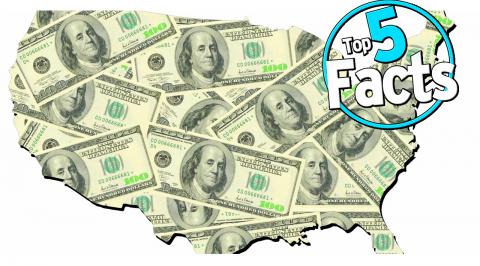Top 5 Facts About Capitalism

Ah capitalism. Best associated with titans of industry such as John D. Rockefeller, Andrew Carnegie, and Mr. Peanut. Welcome to WatchMojo's Top 5 Facts. In this installment we're counting down the five most interesting and revealing facts that we could find about capitalism, the economic system set in place by most developed nations today.
Special thanks to our users EmJay and MikeMJPMUNCH for submitting the idea using our interactive suggestion tool at http://www.WatchMojo.comsuggest
#5: Depending on Who You Ask, China Is Now a Capitalistic Country
Gone are the days of Mao Zedong and the Red Army. China has experienced massive economic growth in recent years and much of this is due to changes in economic structures beginning in the 1970s. Once strictly communist, the Chinese government has been consistently opening itself up to more and more free-market ideologies and is now a hybrid of capitalism and communism– or more aptly a state capitalist society. While financial institutions such as banks are still ran by the Chinese government, foreign investment, class structures, and privatization are symptoms that full blown capitalism may be just down the road for them.
#4: Capitalism Relies on a Process Known as Creative Destruction
Creative destruction is a phenomenon that relies on the destruction of old technology to allow for new and innovative technology to take its place. Netflix is a great example. Who wants to leave their house to rent a movie when you can get movie rentals mailed to you, or, later, just get them on demand? Turns out: nobody. Blockbuster goes under, closing 9000 rental locations, putting nearly 60,000 people out of work. Not to mention all the small mom and pop movie rental store. That’s a lot of hardship for a lot of people. But, as consumers we cheer for this innovation, by and large. C’est la vie. Capitalists would argue this creative destruction was necessary for our society and economy to be better off as a whole.
#3: Not All Forms of Capitalism Are the Same
There are three types of capitalism that are most prevalent in this day and age. At one end of the spectrum is Laissez-faire capitalism, preaching that the less government involvement there is, the better off society will be. Then there’s welfare capitalism, which is most common in developed countries. Services such as social security and healthcare are provided under this system even though they may not make sense economically in the short run. Finally, there’s state capitalism, which is what we discussed in modern day China, where the government controls the means of production– the factories, the fields, the offices– but trademarks of capitalism such as wage labor and class structures are still in place.
#2: It's Possible That Debt Came Before Modern Day Currency
Adam Smith and many other famous economists have outlined how they believe currency came to be. Supposedly it took the place of tedious barter systems, allowing folks to go to the market without taking half their belongings with them for trade. According to these teachings, there could be no debt without currency. However, anthropologist David Graeber has convincingly argued just the opposite; debt has been around long before currency. [1] In his book Debt: The First 5000 Years he cites examples such as clay tablets broken in half, with one half given to the debtor, and one to the creditor that have been discovered way before the onset of coinage. According to him, this has serious ramifications on how we view debt, when we should choose to forgive debt, and government’s role in our market.
#1: Without Bust Cycles, There Can Be No Capitalism
Since the end of World War II, the U.S. has experienced approximately 12 boom-bust cycles. If you’re wondering why an extended period of steady growth is out of the question, the answer is because of capitalism. Economic booms allow people to borrow money easily and therefore invest in new projects, businesses, homes, and more. Unfortunately, there’s such a thing as too much of a good thing, and overinvestment will eventually take place, leading to a decline in value of the above-mentioned items. This decline in value also means a loss of money and jobs and eventually a bust cycle. It seems like every time people panic and think that something has gone wrong, but this is the circle of life in the world of capitalism and the next bull market is usually just around the corner.
So what do you think? Will China one day be the gold standard for free market trade or will we all get tired of boom and bust cycles? And who would win in a fist fight, Mr. Peanut or Rich Uncle Pennybags? For more money-grabbing Top 10s and penny-pinching Top 5s be sure to subscribe to WatchMojo.com.

